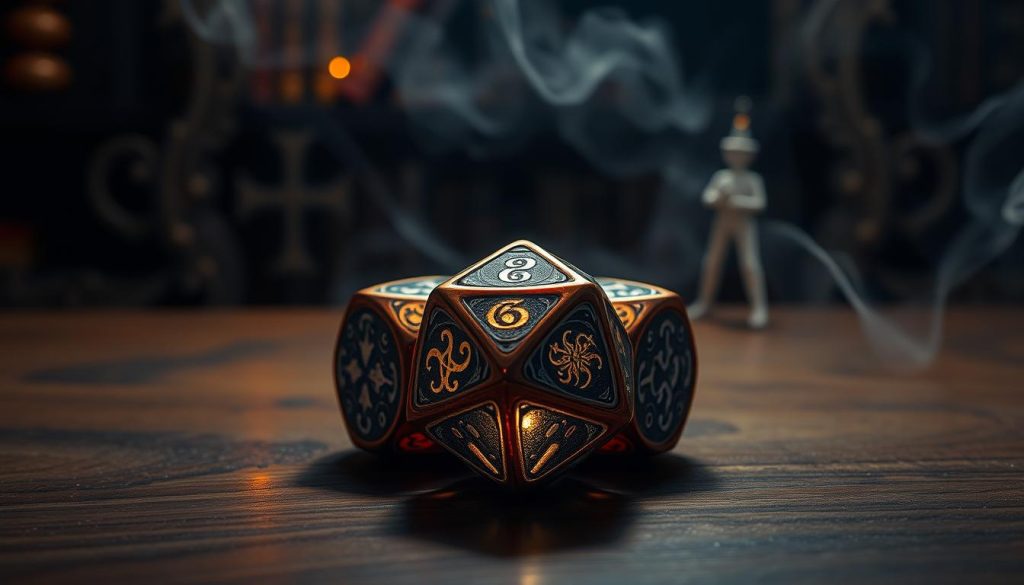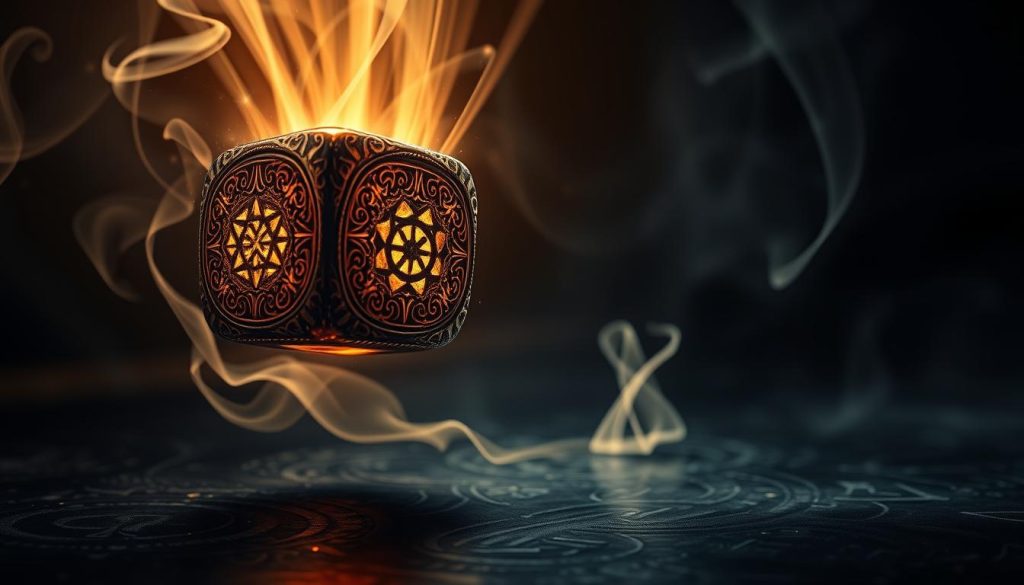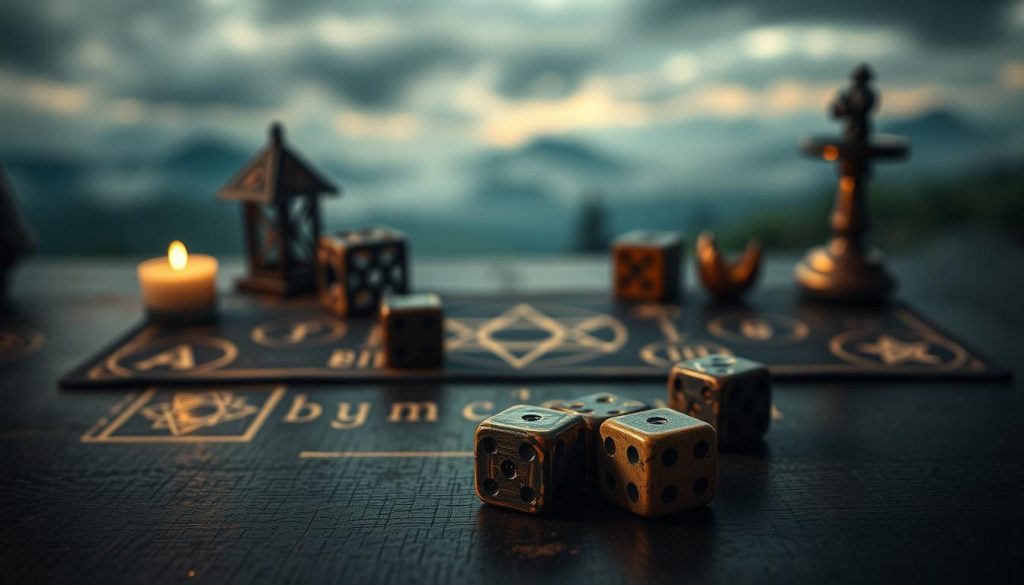Welcome. We invite you to try a small ritual that fits into any moment. This playful tool blends chance and interpretation to help players and seekers with short, clear prompts.
One quick roll becomes a calm window into intuition. You can ask a single question or a list of questions and watch symbols open a path. The process is simple: roll, read, reflect, then act.
Quick character creation and flexible builds show how playful tools can still offer depth. Talents and modular choices make this handy whether you use it in the morning or late at night.
We keep the vibe modern and accessible. No heavy rules, no gatekeeping—just a gentle way to notice what matters that day and find a next step that feels right.
Key Takeaways
- Use a single roll to turn questions into useful prompts.
- Fast, intuitive practice for quick micro-reflection.
- Designed for players and solo seekers who want simple depth.
- Works any time of day as a small ritual or decision aid.
- Flexible, low‑rule approach that invites curiosity and action.
What Is a Dice Oracle and Why Roll Today
A simple toss can turn a fuzzy problem into a clear prompt you can act on.
What it is: A dice oracle is a tiny decision engine. We ask a question, cast the dice, consult a roll table or phrase list, and interpret the result. In solo RPG practice, an oracle often pairs die outcomes with yes/no answers to move a story forward.
How it works: Chance meets interpretation. The dice give an impartial cue. Then we apply context and intent. Popular solo engines like Mythic GME, MUNE, Scarlet Heroes, and One Page Solo Engine use similar mechanics. A lightweight generator or single table can get you started fast.
Why try it now: Oracles speed decisions, spark fresh prompts, and clear mental clutter. Ask one precise question when you feel stuck. Break big problems into smaller yes/no bits and keep momentum.

Benefits at a glance
- Faster decision-making through focused cues.
- New prompts when creativity stalls.
- A brief ritual that creates space and purpose.
Best moments to use an oracle
- Before a meeting or creative session.
- When energy dips or choices feel overwhelming.
- At any small window of time when a nudge helps.
| Use Case | What to Ask | Quick Result |
|---|---|---|
| Writing block | “One next beat?” | Short prompt or scene idea |
| Decision point | “Yes or no option A?” | Clear direction to proceed |
| Creative play | “What complication appears?” | Evocative cue for action |
How to Use Daily Oracle Dice: Roll Our Free Mystical Dice for Instant Guidance
Find a quiet corner, lay out the kit, and invite a little intentional play.
Setup essentials
Gather two 12-sided dice with unique symbols, a phrase booklet, and a paper mat. Place the mat on a flat surface and sit so you can focus. This small setup helps players tune in fast.
Roll the dice
Center your breath, then roll both dice once. When each die shows a symbol, note them quickly. Record the top faces so you can match phrases without losing the moment.

Match symbols to phrases
Open the booklet and find each symbol in the table of phrases. Combine the two lines into a short, two-part message. Read it out loud and let the words land.
Interpret your reading
Use context and intuition. A reading becomes useful when you weave it into your day or a game session. If one die shows “Oxygen” and the other “Sleep paralysis,” the example message might be “Start something new; face the unknown without fear.”
Variations
- Ask one focused question before you roll to guide interpretation.
- Invite a small group to co-interpret; players often hear details others miss.
- If a reset-restart symbol appears, breathe and roll again until you get clear results.
Practical Ways to Use a Dice Oracle for Decisions, Writing, and Play
A single precise question can turn a random outcome into a useful story cue. We use short queries to coax clear answers from a small tool. This approach suits writers, solo players, and groups who want fast momentum.
For fiction and brainstorming: ask a tight question, consult roll tables, and let the generator spark a scene, twist, or character choice. Try three focused questions for one scene and pick the strongest outcome.
In solo RPGs: yes/no oracles keep the game moving when no GM is present. Use Mythic GME, MUNE, Scarlet Heroes, or One Page Solo Engine as your cue generator. Then translate results into prose-friendly beats for your draft.

Tips for better outcomes: frame questions clearly, track results in a notebook, and refine tables so each roll points to story-relevant options. When stuck, shift the question from “What happens?” to “What must be faced now?”
- Run a micro session: outline a problem, ask two questions, log results, pick one action.
- Build custom tables for locations, motives, and secrets to keep prompts specific.
- In group play, invite players to offer interpretations so decisions feel balanced.
Conclusion
When the table quiets, a single cast can open a clear little , window into what to do next. Use a dice oracle as a gentle tool to ask one tight question and get a short answer you can test.
We treat dice oracles as prompts, not verdicts. A player reads the lines, notes when a die shows a repeated symbol, and logs the results. Patterns become useful information, and a fresh table can evolve with your needs.
Keep it simple: ask, consult the phrases, and act. The practice is a small window that helps you decide happens next in life, play, or writing. Try it with a friend and see what outcome appears.
